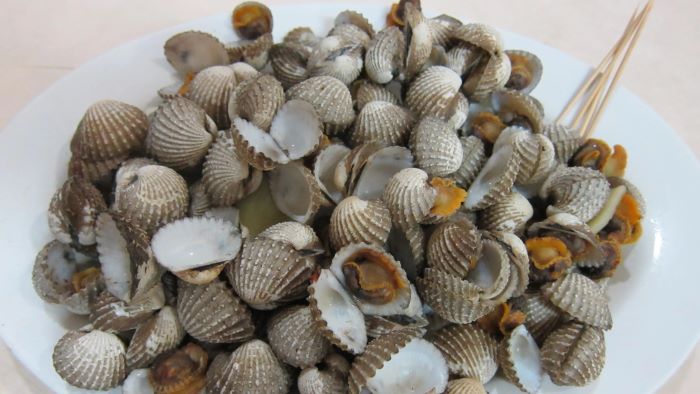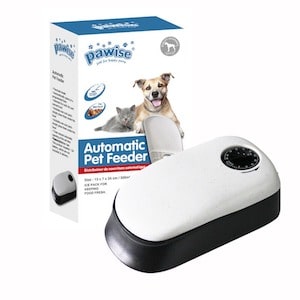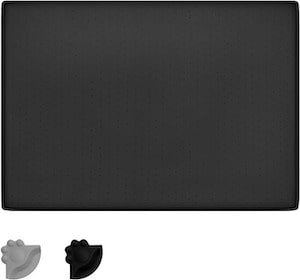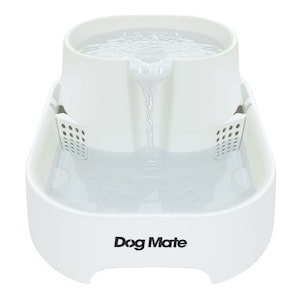Cockles are a type of small, edible bivalve molluscs that are found in coastal areas around the world. They are often eaten by humans as a delicacy, but can they also be fed to dogs? The answer is yes, but with some precautions. Cockles can offer some health benefits for dogs, but they can also cause some health problems if they are not prepared properly or fed in excess.

Key Takeaways
- Cockles are a type of shellfish that can provide protein, iron, magnesium, zinc, omega-3 fatty acids, and various vitamins for dogs.
- Cockles can also pose some risks for dogs, such as allergic reactions, salt toxicity, breathing difficulties, gastrointestinal issues, and vomiting, especially if they are fed raw, uncooked, or in excess.
- Cockles can be cooked and mixed with rice and vegetables to make a tasty and nutritious dish for dogs, but they should be fed in moderation and with caution.
- Cockles are a better option than other shellfish for dogs, as they have less iodine, mercury, and bacteria.
You Might Also Like:
Can Dog Eat Cockles?
Yes, dogs can eat cockles, however, you need to take some necessary measures before you serve them. The prominent reason why dogs can eat cockles is the nutritional benefit it offers. Cockles are a type of shellfish which retain some useful nutrients such as iron, magnesium, zinc, and protein.
Now, before we explore additional benefits, let’s have a closer look at some interesting aspects of this seafood.
Interesting Facts on Cockles
- Cockles are edible shellfish in the family Cardiidae. This suggests that they have 2 shells joined by a thing like mussels and clams. They belong to a group called molluscs.
- Family Cardiidae group of shellfish have heart-shaped shells with ribs on them. In addition, there are more than 200 species of cockles in the Cardiidae family.
- Cockles are less salty and also add a flavour to rice and pasta dishes.
- These shellfish are mostly found on sandy, sheltered beaches. You will find them more in New Zealand, Malaysia, and Northern Europe.
Benefits of Cockles for the dogs

We saw some interesting facts about cockles. In this section, we will have a closer peek at some of the benefits of this seafood for our furry friends. Below are some of the benefits of cockles for dogs:
- Alongside minerals such as iron, magnesium, zinc and protein, cockles also retain selenium and copper. All of these ingredients are helpful in improving metabolic function and supporting a dog’s immune system.
- The presence of high-quality proteins helps in maintaining and developing strong muscles. In addition, it also facilitates the repair of damaged muscle tissues.
- Cockles also supply omega-3 fatty acids. These help control the inflammation and further, improve the dog’s overall coat and skin health.
- Serving cockles can provide some crucial vitamins to your furry friend. These vitamins include – Vitamin A, Vitamin C, Vitamin E, and B12. All of these vitamins support your furry friend’s nervous system and also facilitate red blood cell formation.
- Contain less fat and offer a small amount of energy per saving. This helps in preventing obesity which ultimately avoids health issues like heart disease, arthritis, or diabetes.
The benefits are lucrative, aren’t they? But, remember, they are not a substitute for the regular diet of your furry friend.
The nutritional benefits of cockles are similar to those found in scampi, but it’s important to consider – can dogs have scampi safely?
Drawbacks of Cockles for the Dog
It’s crucial to feed Cockles in moderation or as an occasional treat. Otherwise, your furry friend will likely have some health issues if they are fed in excessive quantities. Here are some of the drawbacks of serving cockles to dogs:
- You may not know but, it’s possible that your furry friend is allergic to shellfish. So, even if you serve them in less quantity they might face some serious infection. They might have inflamed skin or itchiness and you will see them biting, scratching or licking their skin, which is not good.
- Salt in cockles can elevate your dog’s blood pressure. It can also make your furry friend hold more water in their body. High blood pressure can cause severe damage to the heart and blood vessels. Water retention can cause swelling in different regions such as the lungs, kidneys, limbs, or abdomen.
- At times, having excessive cockles can cause breathing issues for your furry friend. This happens because of the allergic reaction that has caused swelling near the tongue, face, or throat. The passage of the airway is blocked and they will find it tough to breathe.
- Your furry friend may suffer from gastrointestinal issues and have stomach aches or worse, diarrhoea after having cockles. This can happen because of the presence of germs or because your dog is sensitive to cockles. Regardless, they will have irritation and their intestinal lining is also affected.
- The sensitivity or intolerance towards cockles may also lead to vomiting issues. The stomach acid is increased after the allergic reaction causing erosion of the stomach lining and inducing vomiting.
The health hazards are quite dangerous and it becomes crucial to manage the quantity of the cockles before serving them to the dogs.
While cockles do have some drawbacks, many owners wonder if treats like prawn crackers are a healthier alternative. For more guidance on prawn crackers, check out our article on “are prawn crackers bad for dogs“.
Homemade Cockles Recipe For Dogs
The drawbacks of serving cockles can scare any dog owner, especially if they are using commercial packs. Yes, you read that right! The commercial package of cockles poses more danger in comparison to a homemade recipe.
A dog is likely to suffer from health issues because of eating such commercial cockles. So, before I suggest you the homemade recipe, let’s have a look at the reasons why these commercial food packs are not recommended for dogs.
- Retain salt, additives, preservatives and spices which are toxic for dogs.
- Can cause allergic reactions and parasitic infections in dogs.
- High in cholesterol and can easily upset a dog’s stomach.
The commercial packs will retain additives or seasonings so, a vet will always recommend serving raw, fresh, or cooked cockles to your furry friend. This basically means a homemade treat. Here is a recipe that can help you:
Homemade Cockles Recipe For Dogs
Ingredients
- 1 Cup Frozen or fresh Cockles
- 2 Cups Water
- ¼ Cup Chopped carrots
- ¼ Cup White rice
- ¼ Cup Chopped celery
Instructions
- Thoroughly rinse the cockles and make sure there is no sand or dirt remaining in them. Also, remove any cockles that seem open or damaged.
- Use a large bowl and add the cockles to the boiled water.
- Cover the bowl and roughly cook for 10 minutes or until you see the shells open. Take out the cockles and put them aside, and allow them to cool down. Reserve the cooking water.
- Take another bowl and add some rice to it. Add the reserved cooking water and allow the mixture to get boiled.
- Using less heat, steam the mixture for roughly 15 minutes or til the rice gets fluffy and tender. Fluff using a fork and set it aside.
- With the help of the remaining water, mix the carrots and celery and boil them for roughly 10 minutes in a saucepan. You can also boil the mix until the vegetables become soft.
- Take the meat from the cockle shells and chop them. Make sure that you chop them into small pieces. Get rid of the shells.
- Take a large bowl and mix the vegetables, rice, and chopped meat pieces together. Add a pinch of salt for a better taste.
- Serve the fresh dish to your dog. You can also store the remaining food treat in an airtight container for serving again.
This homemade recipe is safe for your furry friend. But, you can choose not to add salt to the mix of ingredients for ensuring the treat remains safe for your furry friend.
Perks of serving homemade cockles recipe to dogs

The health benefits of serving homemade cockles to your dog are evident but, there are some additional perks of offering them the homemade food treat:
- You have complete control over the quantity and quality of the ingredients. This means you can avoid using preservatives, additives, or any food ingredient which may harm your dog. The quantity aspect makes it easier for you to control the intake of cockles.
- Once you consult with your vet, you can easily formulate the best recipe which will meet your dog’s health requirements and match their preferences. You can adjust the vegetable content, grains or other ingredients as per their dietary needs.
- You save some money because you will be using the vegetables which you already cooked and used in your meals. In addition, if you buy fresh or frozen cockles while they are cheap in the market you can save more.
- This may seem unusual but, offering such a treat may help improve your bonding with your furry friend. The effect is more if you have your meal with them while they are eating.
Further, you can also add some other ingredients, especially the ones which are meant for treating a specific medical condition.
While shellfish like cockles should only be occasional treats, whitefish like haddock can be integrated into your dog’s diet in moderation. But be sure to research first and ask your vet – can dogs eat haddock regularly?
Additional ingredients for cockle homemade recipe
If your dog has some specific medical condition, a vet may suggest you change their regular diet. At times, cockles shells with a mix of certain ingredients can help overcome health issues in dogs. So, here are some of the additional ingredients you can use for different health issues:
- For Inflammation and arthritis – ginger and turmeric
In the mixture of cockles and rice, you can add some ginger and turmeric for reducing stiffness and pain. Both these ingredients have anti-inflammatory properties and help with inflammation and arthritis.
In addition, you can also use coconut oil instead of water while making the dish. The medium-chain fatty acids present in coconut oil can also contribute to relieving dogs from inflammation and improving their joint health. Instead of rice, you can also use potato in the mix with cockles.
- For fatigue or anemia – spinach and liver
Adding spinach and liver in the mix of cockles and rice will help in boosting the dog’s energy levels and blood production. This happens because both the ingredients retain iron and Vitamin B12.
In addition, you can also use quinoa instead or rice as the mixed ingredient. Quinoa has more iron and protein in comparison to rice and helps prevent anemia or fatigue issues in dogs.
- For heart disease – flax, blueberries and seeds
Using blueberries, flax and seeds in the mix with cockles quinoa mixture will help in dealing with heart disease in dogs. All these ingredients are antioxidants and also have omega-3 fatty acids.
Hence, the cholesterol level and blood pressure remain normal in dogs and there is minimal chance for any oxidative stress. This means the heart remains in good health. In addition, instead of quinoa, you can also use brown rice for regulating cholesterol and blood sugar levels better.
- For bone health and nerve function – banana, almonds and oatmeal
A cockle and oatmeal mixture with the presence of bananas and almonds can help in improving the bone health and nerve function of a dog. The high proportion of potassium and magnesium helps in achieving these prospects.
Further, if you wish to have better results, you can use rice instead of oatmeal. The reason behind this is the phosphorus and calcium in rice will help in strengthening your furry friend’s bones even better.
- For Wound healing or the immune system – broccoli, and pumpkin seeds
If you mix pumpkin seeds and broccoli with cockles and rice in the mixture, you will see that it helps improve the immune system of the dog and also facilitate wound healing. The reason for such an impact is the presence of zinc and Vitamin C.
In addition, you can also replace rice and use barley with cockles. Because barley has more beta-glucan and helps in improving immune response and fighting infections in the dog’s body.
Cockles and Whelks – Which One Is Good For Dogs?
Cockles and Whelks both are popular British cuisine. But, both of these seafood have different prospects when it comes to serving dogs. While we saw different benefits and risks pertaining to cockles, in this section, we will understand whether whelks can be an alternative to cockles or not.
- Family – Cockles belong to Cardiidae whereas Whelks are part of the Buccinidae.
- Shape and size – Whelks have elongated spiral shells with spines or knobs whereas cockles have rounded ones. In general, cockles are smaller than whelks.
- Nutrition – Whelks have calcium, protein, copper, and vitamin B12 which can benefit dogs just like Cockles do.
- Flavour – Cockles have a delicate and mild flavour whereas wheels have an intense and fishy taste. They have a tough chewy texture whereas cockles have a soft and smooth texture.
- Cost – The price for both cuisines varies per region and area. Whelks are cheaper and also have a longer shelf life in comparison to cockles. Whelks roughly cost about £19.95 per 2lb. Cockles cost about £26.
Now, you may have realised that the availability and cost of whelks and the identical nutritional benefits make dog owners pick this seafood for their furry friends. While there is nothing harmful it’s given as an occasional treat but, cockles are still a better option.
You are like why? Well, whelks are tougher and chewier in comparison to cockles after cooking. Also, the nutrition distribution may seem identical but, whelks do not retain Magnesium, Iron, Zinc, and Omega-3 fatty acids. This means it’s less beneficial in comparison to cockles.
So, don’t get carried away with the pricing and storage benefits of Whelks. Serve cockles as they can provide more nutrient elements than whelks would.
Winkles and Cockles – Which One Is Better For Dogs?
Similar to Cockles and Whelks, Winkles and Cockles are also compared by dog owners while they plan on including seafood in their furry friend’s recipes. Let’s see if Winkles manages to surpass the benefits of cockles or not.
- Family, Size, and Shape – Winkles belong to the family Littorniade. These are basically gastropods conical shells and rigid or smooth surfaces. Quite different from Cockles.
- Flavour – Cockles have a light flavour while Winkles have a sweet flavour. They are also firm and crunchy in texture when compared to the soft and smooth texture of cockles.
- Nutrition – Winkles retain copper, calcium, protein and Vitamin B12. These nutrients are beneficial for dogs.
- Cost – Winkles cost less than cockles. They are approximately £19 per 2lb.
Again, like whelks, winkles also have low cost and are providing some identical nutritious benefits like cockles do. But, they don’t have Iron, magnesium, omega-3 fatty acids, or zinc. So, you must not use Winkles, especially if you are looking to leverage more healthy benefits.
But, what if you have to pick from winkles and whelks? Which one suits better for your furry friend? Well, in general, dogs have mostly preferred Winkles over whelks. Here are some of the reasons justifying the choice:
- Winkles are more pleasant in taste when compared to whelks.
- There are more nutritional benefits for dogs in eating Winkles instead of whelks.
- Shells of Winkles are thin and dogs can easily play with them.
- Less chewing effort is required while eating winkles.
FAQs
Which seafood is considered safe for dogs?
Seafood such as Mussels and fish oil are considered safe for dogs. Mussels have protein, iron, zinc and magnesium in them which can improve a dog’s cellular metabolism and muscle health. Fish oil contains omega-3 fatty acids which improve the dog’s skin health and immune system. However, both seafood needs to be cooked properly before serving and in moderation.
Are cockles clams the same?
No, cockles are not the same as clams. Clams belong to the invertebrate class Bivlivia and it includes molluscs with 2 shells that are connected with a hinge. The cockles are part of the Cardiidae family of shells which are bivalves related to clams and that’s the reason why cockles and clams are comprehended the same. The confusion is obvious as their shapes are similar, but, cockles have heart-shaped shells with prominent ribs which help in differentiating cockles and clams.
Which seafood is dangerous for dogs?
Tuna, Swordfish, Fish Bones, Farmed fish, and Raw Salmon are some dangerous seafood and should not be given to dogs. Because if the dog has these items they are at risk of suffering Histamine poisoning, Mercury Poisoning, Salmon Poisoning, Intestinal Obstruction, Bacterial Infections, or Salt toxicity.
Which dog breeds in the UK are allergic to cockles?
There is no exact answer but, German Shepherds, Border Collies, and Terriers are the dog breeds which are allergic to cockles. They may show allergic reactions because the immune system overreacts to the proteins of cockles. This response produces antibodies causing irritation and inflammation.
Is it OK for dogs to eat clams?
Yes, dogs can eat clams. They can provide some useful nutrition benefits and help improve dogs’ health. These shellfish retain Vitamin B12, protein, iron, and omega-3 fatty acids. But, if these are fed raw, uncooked or without removing shells, then are fatal for dogs.
Can Dogs Eat Cockles? Final Comment
You can serve cockles to dogs but, need to manage the quantity and quality. Because if your furry friend ends up eating more than they can tolerate, it is poisonous for them. Not only they would suffer gastrointestinal issues but, may also die.
As a vet, I strongly recommend serving this in moderation and not more than twice a month and that too a homemade treat. Under no circumstances you are to feed them raw or commercial pack cockles. Because they contain different bacteria, parasites, and toxins which may harm dogs. They can also prove to be choking hazards as they can cause intestinal blockage.
Also, some dogs are allergic to them and may have issues like itching, swelling, vomiting, diarrhoea, or difficulty breathing. So, make sure you avoid serving large amounts of cockles to your dog. If you observe any irregular symptoms after serving cockles to your dog consult your vet.






